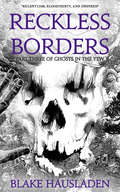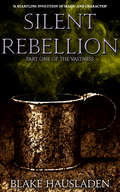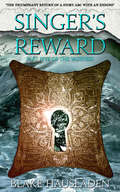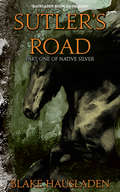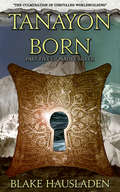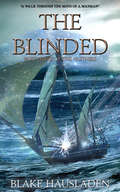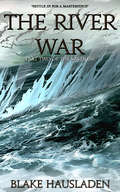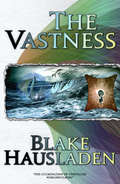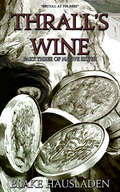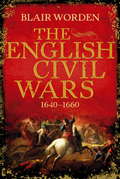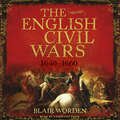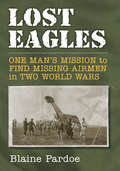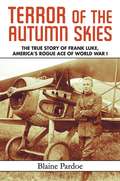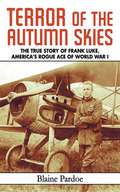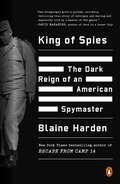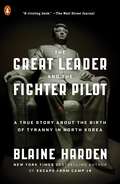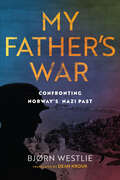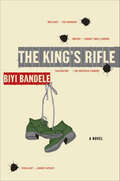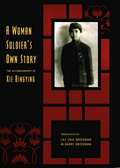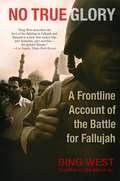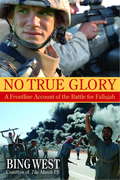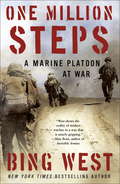- Table View
- List View
Reckless Borders (Ghosts in the Yew #3)
by Blake Hausladen"Vivid world building, interesting plot, and a gorgeous book.... If you liked Jordan's Wheel of Time books I think you will like this one as well.” – Nadine, GoodreadsThis novella is part three of Ghosts in the Yew, also available as a collection.Enhedu’s hostile neighbors have plans of their own. Across the country magic grows.“Everything we knew or loved was gone. We felt each of the wounds that had killed us and longed for the touch of our kin – longed to see the smile or hear the coo of our children.”The country is tested in this epic fantasy surrounded by the mystery of old gods, blood magic, and statecraft. Ignited by redemption and conquest, this journey will test their struggles to survive and will put them at odds with their families, their nation, and the very powers that shaped the world. But, this story is bigger than them.It’s bigger than all of us..You can read the trilogy in full volumes, or broken up into five novellas each.The Vestal Series1. Ghosts in the Yew Novella 1 - Beyond the Edge Novella 2 - Opposing Oaths Novella 3 - Reckless Borders Novella 4 - Bayen's Women Novella 5 - Falling Tides2. Native Silver Novella 1 - Sutler's Road Novella 2 - Forgotten Stairs Novella 3 - Thrall's Wine Novella 4 - Corsair Princess Novella 5 - Tanayon Born 3. The Vastness Novella 1 - Silent Rebellion Novella 2 - The River War Novella 3 - The Blinded Novella 4 - Crimson Valley Novella 5 - Singer's Reward“Ghosts in the Yew is what I wish every self-published book I've read could be.” –– The Arched Doorway“The characters and world created in Ghosts in the Yew are complex and multifaceted. If you want to be drawn into a story where you care about the characters, where you cannot tell what is going to happen next, then you need to buy this book.” – Natasha, Goodreads
Silent Rebellion (The Vastness #1)
by Blake HausladenThis novella is part one of The Vastness, also available as a collection.Emilia, a girl who lives inside her head with numbers as a slave to a city that consumes all those like her. Emi quickly becomes the center of a vast rebellion as a magic grows inside her, unparallel to anything known.“The main character is very complex and the story is full and complete for a novella. I hope to see Emilia in future novels to learn more about her. I highly recommend all three books by this very detailed and complex author.” – Amazon ReviewThe Vastness is the third and final omnibus collection to the Vesteal Series. The Vastness takes us deep into the capital of Bessradi, following the chaos of Native Silver, where new magic is emerging. Ghosts stir, the ground shakes, and an unknown magic has been unleashed. Blood soon becomes as important as air, and our characters struggle to keep the world balanced.In the end, the war will be over, but which side will win?“I tried to hold his threads together, but I could not touch them. His being came apart, and I was splashed with a sick wash of darkness.” - EmiYou can read the trilogy in full volumes, or broken up into five novellas each.The Vestal SeriesA tale of violent magic, intrigue, and statecraft, the Vesteal Series is the story of four souls that are banished beyond the edge of the map to a land of gnarled forests, ancient magic, and the site of a terrible murder. Their struggles to survive will put them at odds with their families, their nation, and the very powers that shaped the world.1. Ghosts in the Yew Novella 1 - Beyond the Edge Novella 2 - Opposing Oaths Novella 3 - Reckless Borders Novella 4 - Bayen's Women Novella 5 - Falling Tides2. Native Silver Novella 1 - Sutler's Road Novella 2 - Forgotten Stairs Novella 3 - Thrall's Wine Novella 4 - Corsair Princess Novella 5 - Tanayon Born 3. The Vastness Novella 1 - Silent Rebellion Novella 2 - The River War Novella 3 - The Blinded Novella 4 - Crimson Valley Novella 5 - Singer's Reward
Singer's Reward (The Vastness #5)
by Blake HausladenThis novella is part five of The Vastness, also available as a collection.10 years of storytelling has led to this moment. Creative energy cultivates into a gruesome magical battle as horrors emerge from the sea and sky. The most ancient of magic must be harnessed and controlled. Four kings meet and long-awaited reunions take place.In the end, the war will be over, but which side will win?The Vastness is the third and final omnibus collection to the Vesteal Series. The Vastness takes us deep into the capital of Bessradi, following the chaos of Native Silver, where new magic is emerging. Ghosts stir, the ground shakes, and an unknown magic has been unleashed. Blood soon becomes as important as air, and our characters struggle to keep the world balanced.You can read the trilogy in full volumes, or broken up into five novellas each.The Vestal SeriesA tale of violent magic, intrigue, and statecraft, the Vesteal Series is the story of four souls that are banished beyond the edge of the map to a land of gnarled forests, ancient magic, and the site of a terrible murder. Their struggles to survive will put them at odds with their families, their nation, and the very powers that shaped the world.1. Ghosts in the Yew Novella 1 - Beyond the Edge Novella 2 - Opposing Oaths Novella 3 - Reckless Borders Novella 4 - Bayen's Women Novella 5 - Falling Tides2. Native Silver Novella 1 - Sutler's Road Novella 2 - Forgotten Stairs Novella 3 - Thrall's Wine Novella 4 - Corsair Princess Novella 5 - Tanayon Born 3. The Vastness Novella 1 - Silent Rebellion Novella 2 - The River War Novella 3 - The Blinded Novella 4 - Crimson Valley Novella 5 - Singer's Reward
Sutler's Road (Native Silver #1)
by Blake Hausladen“If you enjoy epic fantasy, particularly epic fantasy in which the world building is superb, do yourself a favor and grab Ghost in the Yew and Native Silver.” – Stephen, GoodreadsThis novella is part one of Native Silver, also available as a collection.You can read the trilogy in full volumes, or broken up into five novellas each.The Vestal Series1. Ghosts in the Yew Novella 1 - Beyond the Edge Novella 2 - Opposing Oaths Novella 3 - Reckless Borders Novella 4 - Bayen's Women Novella 5 - Falling Tides2. Native Silver Novella 1 - Sutler's Road Novella 2 - Forgotten Stairs Novella 3 - Thrall's Wine Novella 4 - Corsair Princess Novella 5 - Tanayon Born 3. The Vastness Novella 1 - Silent Rebellion Novella 2 - The River War Novella 3 - The Blinded Novella 4 - Crimson Valley Novella 5 - Singer's Reward“Rich and wonderful characters drive this epic tale.” – Matthew, Goodreads
Tanayon Born (Native Silver #5)
by Blake Hausladen“SO GOOD! Blake Hausladen knockes it out of the park with "Native Silver"! …Engaging throughout, but buckle your seatbelt for the last bit!” – Cheri, GoodreadsThis novella is part five of Native Silver, also available as a collection.You can read the trilogy in full volumes, or broken up into five novellas each.The newborn Vesteal is in danger. The Shadow gains a powerful new ally.And the Kaaryon’s princes come home.“My words froze in my throat as a darkness gripped me. The Shadow. He was awake, and He was there – summoned up into the city like never before. The ground shook, and the city yelled out in fright.” – Sikhek (Chapter 83, Native Silver)The Vestal SeriesA tale of violent magic, intrigue, and statecraft, the Vesteal Series is the story of four souls that are banished beyond the edge of the map to a land of gnarled forests, ancient magic, and the site of a terrible murder. Their struggles to survive will put them at odds with their families, their nation, and the very powers that shaped the world.1. Ghosts in the Yew Novella 1 - Beyond the Edge Novella 2 - Opposing Oaths Novella 3 - Reckless Borders Novella 4 - Bayen's Women Novella 5 - Falling Tides2. Native Silver Novella 1 - Sutler's Road Novella 2 - Forgotten Stairs Novella 3 - Thrall's Wine Novella 4 - Corsair Princess Novella 5 - Tanayon Born 3. The Vastness Novella 1 - Silent Rebellion Novella 2 - The River War Novella 3 - The Blinded Novella 4 - Crimson Valley Novella 5 - Singer's Reward
The Blinded (The Vastness #3)
by Blake HausladenThis novella is part three of The Vastness, also available as a collection.The truth of the gods is starting to be revived. Soma overcomes challenges at sea while Barok faces rebellion in Enhedu. Dia has a choice to make that determines everything.“The sea fell away below us and we hurtled into darkness—a vast unending expanse that contained all things and nothing. My perception steadied as though my eyes were healing. All around me threads of great color lashed and warred. We had arrived at the place where it had started—the vastness.” - SikhekThe Vastness is the third and final omnibus collection to the Vesteal Series. The Vastness takes us deep into the capital of Bessradi, following the chaos of Native Silver, where new magic is emerging. Ghosts stir, the ground shakes, and an unknown magic has been unleashed. Blood soon becomes as important as air, and our characters struggle to keep the world balanced.In the end, the war will be over, but which side will win?You can read the trilogy in full volumes, or broken up into five novellas each.The Vestal SeriesA tale of violent magic, intrigue, and statecraft, the Vesteal Series is the story of four souls that are banished beyond the edge of the map to a land of gnarled forests, ancient magic, and the site of a terrible murder. Their struggles to survive will put them at odds with their families, their nation, and the very powers that shaped the world.1. Ghosts in the Yew Novella 1 - Beyond the Edge Novella 2 - Opposing Oaths Novella 3 - Reckless Borders Novella 4 - Bayen's Women Novella 5 - Falling Tides2. Native Silver Novella 1 - Sutler's Road Novella 2 - Forgotten Stairs Novella 3 - Thrall's Wine Novella 4 - Corsair Princess Novella 5 - Tanayon Born 3. The Vastness Novella 1 - Silent Rebellion Novella 2 - The River War Novella 3 - The Blinded Novella 4 - Crimson Valley Novella 5 - Singer's Reward
The River War (The Vastness #2)
by Blake HausladenThis novella is part two of The Vastness, also available as a collection.War begins to brew as a desperate mission to the frozen edge of the world is mounted in order to rescue Enhedu’s stolen children.Average people gain magic and blood quickly becomes as important as air.“I’m not a daughter who needs to be warned of the dangers of the world. I’m a queen.” -Dia The Vastness is the third and final omnibus collection to the Vesteal Series. The Vastness takes us deep into the capital of Bessradi, following the chaos of Native Silver, where new magic is emerging. Ghosts stir, the ground shakes, and an unknown magic has been unleashed. Blood soon becomes as important as air, and our characters struggle to keep the world balanced.In the end, the war will be over, but which side will win?“I was delivering kings to troubled lands and perusing an enemy I did not know how to defeat toward an unknown shore.” - Soma O’NropeelYou can read the trilogy in full volumes, or broken up into five novellas each.The Vestal SeriesA tale of violent magic, intrigue, and statecraft, the Vesteal Series is the story of four souls that are banished beyond the edge of the map to a land of gnarled forests, ancient magic, and the site of a terrible murder. Their struggles to survive will put them at odds with their families, their nation, and the very powers that shaped the world.1. Ghosts in the Yew Novella 1 - Beyond the Edge Novella 2 - Opposing Oaths Novella 3 - Reckless Borders Novella 4 - Bayen's Women Novella 5 - Falling Tides2. Native Silver Novella 1 - Sutler's Road Novella 2 - Forgotten Stairs Novella 3 - Thrall's Wine Novella 4 - Corsair Princess Novella 5 - Tanayon Born 3. The Vastness Novella 1 - Silent Rebellion Novella 2 - The River War Novella 3 - The Blinded Novella 4 - Crimson Valley Novella 5 - Singer's Reward
The Vastness (Vesteal Series #3)
by Blake Hausladen‘Blake excels at world-building, and his book is so detailed in so many areas that he either conducted an astounding amount of research...or he knows lots more than the average person.” – Kate Norlander, author of Geek CultureThe Vastness is the third and final omnibus collection to the Vesteal Series. The Vastness takes us deep into the capital of Bessradi, following the chaos of Native Silver, where new magic is emerging. A girl who lives inside her head with numbers becomes the center of a vast rebellion, while far to the north the people of Enhedu are scattered, their keep in ruins. Ghosts stir, the ground shakes, and an unknown magic has been unleashed. A desperate mission to the frozen edge of the world must be mounted in order to rescue Enhedu’s stolen children while the war for Zoviya tears down families, provinces, and religions. Blood becomes as important as air, and our characters struggle to keep the world balanced. The ending to this epic fantasy series is full of surprise and intrigue. In the end, the war will be over, but which side will win?"It reminds me a bit of Tolkien, so for those that love fantasy and an in depth story this book is a must read.” – Fleur, GoodreadsThe Vestal SeriesA tale of violent magic, intrigue, and statecraft, the Vesteal Series is the story of four souls that are banished beyond the edge of the map to a land of gnarled forests, ancient magic, and the site of a terrible murder. Their struggles to survive will put them at odds with their families, their nation, and the very powers that shaped the world.1. Ghosts in the Yew Novella 1 - Beyond the Edge Novella 2 - Opposing Oaths Novella 3 - Reckless Borders Novella 4 - Bayen's Women Novella 5 - Falling Tides2. Native Silver Novella 1 - Sutler's Road Novella 2 - Forgotten Stairs Novella 3 - Thrall's Wine Novella 4 - Corsair Princess Novella 5 - Tanayon Born 3. The Vastness Novella 1 - Silent Rebellion Novella 2 - The River War Novella 3 - The Blinded Novella 4 - Crimson Valley Novella 5 - Singer's Reward“Blake Hausladen takes you on a journey threw distant lands, romance, action, comedy, suspense,and mystery. The Vesteal series will easily be on of your favorites in your collection.” – Kyle, Goodreads
Thrall's Wine (Native Silver #3)
by Blake Hausladen“I found it deeply satisfying. It made me happy to read it. I look forward to reading the next. I can't think of greater praise.” – Ron, GoodreadsThis novella is part three of Native Silver, also available as a collection.You can read the trilogy in full volumes, or broken up into five novellas each.Soma conquers the great vastness of the ocean as new dangers emerge that threaten Enhedu.“She was a singer like Geart, and the touch of her magic was horrible.” – Boatswain Soma O’Nropeel (Chapter 34, Native Silver)The Vestal SeriesA tale of violent magic, intrigue, and statecraft, the Vesteal Series is the story of four souls that are banished beyond the edge of the map to a land of gnarled forests, ancient magic, and the site of a terrible murder. Their struggles to survive will put them at odds with their families, their nation, and the very powers that shaped the world.1. Ghosts in the Yew Novella 1 - Beyond the Edge Novella 2 - Opposing Oaths Novella 3 - Reckless Borders Novella 4 - Bayen's Women Novella 5 - Falling Tides2. Native Silver Novella 1 - Sutler's Road Novella 2 - Forgotten Stairs Novella 3 - Thrall's Wine Novella 4 - Corsair Princess Novella 5 - Tanayon Born 3. The Vastness Novella 1 - Silent Rebellion Novella 2 - The River War Novella 3 - The Blinded Novella 4 - Crimson Valley Novella 5 - Singer's Reward
The English Civil Wars: 1640-1660
by Blair WordenA brilliant appraisal of the Civil War and its long-term consequences, by an acclaimed historian.The political upheaval of the mid-seventeenth century has no parallel in English history. Other events have changed the occupancy and the powers of the throne, but the conflict of 1640-60 was more dramatic: the monarchy and the House of Lords were abolished, to be replaced by a republic and military rule.In this wonderfully readable account, Blair Worden explores the events of this period and their origins - the war between King and Parliament, the execution of Charles I, Cromwell's rule and the Restoration - while aiming to reveal something more elusive: the motivations of contemporaries on both sides and the concerns of later generations.
The English Civil Wars: 1640-1660
by Blair WordenA brilliant appraisal of the Civil War and its long-term consequences, by an acclaimed historian.The political upheaval of the mid-seventeenth century has no parallel in English history. Other events have changed the occupancy and the powers of the throne, but the conflict of 1640-60 was more dramatic: the monarchy and the House of Lords were abolished, to be replaced by a republic and military rule.In this wonderfully readable account, Blair Worden explores the events of this period and their origins - the war between King and Parliament, the execution of Charles I, Cromwell's rule and the Restoration - while aiming to reveal something more elusive: the motivations of contemporaries on both sides and the concerns of later generations.
The English Civil Wars: 1640-1660 (UNIVERSAL HISTORY)
by Blair WordenA brilliant appraisal of the Civil War and its long-term consequences, by an acclaimed historian.The political upheaval of the mid-seventeenth century has no parallel in English history. Other events have changed the occupancy and the powers of the throne, but the conflict of 1640-60 was more dramatic: the monarchy and the House of Lords were abolished, to be replaced by a republic and military rule.In this wonderfully readable account, Blair Worden explores the events of this period and their origins - the war between King and Parliament, the execution of Charles I, Cromwell's rule and the Restoration - while aiming to reveal something more elusive: the motivations of contemporaries on both sides and the concerns of later generations.
Lost Eagles: One Man's Mission to Find Missing Airmen in Two World Wars
by Blaine PardoePraise forLost Eagles "The pilot and observer stories selected have not previously seen much exposure. Not only are they interesting, but I found myself relishing getting to the next chapter to find out what Frederick Zinn was doing during the next stage of his life. " ---Alan Roesler, founding member, League of World War I Aviation Historians, and former Managing Editor,Over the Front Praise for Blaine Pardoe's previous military histories (which average 4. 5-star customer reviews on Amazon. com): Terror of the Autumn Skies: The True Story of Frank Luke, America's Rogue Ace of World War I "This painstaking biography of World War I ace Frank Luke will earn Pardoe kudos . . . Pardoe has flown a very straight course in researching and recounting Luke's myth-ridden life. . . . Thorough annotation makes the book that much more valuable to WWI aviation scholars as well as for more casual air-combat buffs. " ---Booklist The Cruise of the Sea Eagle: The Amazing True Story of Imperial Germany's Gentleman Pirate "This is a gem of a story, well told, and nicely laid out with photos, maps, and charts that cleverly illuminate the lost era of 'gentlemen pirates' at sea . . . [German commerce raider Felix von Luckner's] legend lives on in this lively and readable biography. " ---Admiral James Stavridis, U. S. Navy, Naval History Few people have ever heard of Frederick Zinn, yet even today airmen's families are touched by this man and the work he performed in both world wars. Zinn created the techniques still in use to determine the final fate of airmen missing in action. The last line of the Air Force Creed reads, "We will leave no airman behind. " Zinn made that promise possible. Blaine Pardoe weaves together the complex story of a man who brought peace and closure to countless families who lost airmen during both world wars. His lasting contribution to warfare was a combination of his methodology for locating the remains of missing pilots (known as the Zinn system) and his innovation of imprinting all aircraft parts with the same serial number so that if a wreck was located, the crewman could be identified. The tradition he established for seeking and recovering airmen is carried on to this day. Blaine Pardoe is an accomplished author who has published dozens of military fiction novels and other books, including the widely acclaimedCubicle Warfare: Self-Defense Tactics for Today's Hypercompetitive Workplace;Terror of the Autumn Skies: The True Story of Frank Luke, America's Rogue Ace of World War I;andThe Cruise of the Sea Eagle: The Amazing True Story of Imperial Germany's Gentleman Pirate. Jacket photo: Frederick Zinn's Sopwith aircraft, which crashed during World War I. National Museum of the United States Air Force Archives.
Terror of the Autumn Skies
by Blaine PardoeFrank Luke, Jr., was an unlikely pilot. In the Great War, when fliers were still "knights of the air," Luke was an ungallant loner, a kid from Arizona who collected tarantulas, shot buzzards, and boxed miners. But during two torrid weeks in September 1918, he was the deadliest man on the Western Front. In only ten missions, he destroyed fourteen heavily-defended German balloons and four airplanes, a rampage unequaled even by the dreaded von Richtofen, and the second highest American tally of the entire war. Cocksure and constantly reprimanded, Luke was actually under arrest on the day of his final flight, but he stole a plane to join the fatal action that won him the first Congressional Medal of Honor awarded to a pilot. Blaine Pardoe retraces and refreshes Frank Luke's story through recently discovered correspondence. What emerges is a portrait of a life out of an "Old West" that was, by the late Teens, colliding with modernity. Frantic, short, and splendid, the life of Frank Luke, Jr. dramatizes the tragic intervention of an American spirit in the war that devastated Europe.
Terror of the Autumn Skies: The True Story of Frank Luke, America's Rogue Ace of World War I
by Blaine PardoeFrank Luke, Jr. was an unlikely pilot. In the Great War, when fliers were still ?knights of the air,” Luke was an ungallant loner?a kid from Arizona who collected tarantulas, shot buzzards, and boxed miners. But during two torrid weeks in September 1918, he was the deadliest man on the Western Front. In only ten missions, he destroyed fourteen heavily-defended German balloons and four airplanes, the second highest American tally in the entire war. Author Blaine Pardoe retraces and refreshes Frank Luke’s story through recently discovered correspondence. Frantic, short, and splendid, the life of Frank Luke, Jr. dramatizes the tragic intervention of an American spirit in the war that devastated Europe.
King of Spies: The Dark Reign of America's Spymaster in Korea
by Blaine HardenFrom the New York Times bestselling author of Escape from Camp 14, the shocking, gripping account of the most powerful American spy you’ve never heard of, whose role at the center of the Korean War—which gave rise to the North Korean regime—is essential to understanding the most intractable foreign policy conflict of our time. In 1946, master sergeant Donald Nichols was repairing jeeps on the sleepy island of Guam when he caught the eye of recruiters from the army's Counter Intelligence Corps. After just three months' training, he was sent to Korea, then a backwater beneath the radar of MacArthur's Pacific Command. Though he lacked the pedigree of most U.S. spies—Nichols was a 7th grade dropout—he quickly metamorphosed from army mechanic to black ops phenomenon. He insinuated himself into the affections of America’s chosen puppet in South Korea, President Syngman Rhee, and became a pivotal player in the Korean War, warning months in advance about the North Korean invasion, breaking enemy codes, and identifying most of the targets destroyed by American bombs in North Korea. But Nichols's triumphs had a dark side. Immersed in a world of torture and beheadings, he became a spymaster with his own secret base, his own covert army, and his own rules. He recruited agents from refugee camps and prisons, sending many to their deaths on reckless missions. His closeness to Rhee meant that he witnessed—and did nothing to stop or even report—the slaughter of tens of thousands of South Korean civilians in anticommunist purges. Nichols’s clandestine reign lasted for an astounding eleven years. In this riveting book, Blaine Harden traces Nichols's unlikely rise and tragic ruin, from his birth in an operatically dysfunctional family in New Jersey to his sordid postwar decline, which began when the U.S. military sacked him in Korea, sent him to an air force psych ward in Florida, and subjected him—against his will—to months of electroshock therapy. But King of Spies is not just the story of one American spy: with napalmed villages and severed heads, high-level lies and long-running cover-ups, it reminds us that the darkest sins of the Vietnam War—and many other conflicts that followed—were first committed in Korea.
The Great Leader and the Fighter Pilot
by Blaine HardenFrom the New York Times bestselling author of Escape From Camp 14, Blaine Harden tells the riveting story of Kim Il Sung's rise to power, and the brave North Korean fighter pilot who escaped the prison state and delivered the first MiG-15 into American handsIn The Great Leader and the Fighter Pilot, New York Times bestselling author Blaine Harden tells the riveting story of how Kim Il Sung grabbed power and plunged his country into war against the United States while the youngest fighter pilot in his air force was playing a high-risk game of deception--and escape.As Kim ascended from Soviet puppet to godlike ruler, No Kum Sok noisily pretended to love his Great Leader. That is, until he swiped a Soviet MiG-15 and delivered it to the Americans, not knowing they were offering a $100,000 bounty for the warplane (the equivalent of nearly one milliondollars today). The theft--just weeks after the Korean War ended in July 1953--electrified the world and incited Kim's bloody vengeance.During the Korean War the United States brutally carpet bombed the North, killing hundreds of thousands of civilians and giving the Kim dynasty, as Harden reveals, the fact-based narrative it would use to this day to sell paranoia and hatred of Americans.Drawing on documents from Chinese and Russian archives about the role of Mao and Stalin in Kim's shadowy rise, as well as from neverbefore- released U.S. intelligence and interrogation files, Harden gives us a heart-pounding escape adventure and an entirely new way to understand the world's longest-lasting totalitarian state.From the Hardcover edition.
The Great Leader and the Fighter Pilot: The True Story of the Tyrant Who Created North Korea and the Young Lieutenant Who Stole His Way to Freedom
by Blaine HardenFrom the New York Times bestselling author of Escape From Camp 14, Blaine Harden tells the riveting story of Kim Il Sung's rise to power, and the brave North Korean fighter pilot who escaped the prison state and delivered the first MiG-15 into American handsIn The Great Leader and the Fighter Pilot, New York Times bestselling author Blaine Harden tells the riveting story of how Kim Il Sung grabbed power and plunged his country into war against the United States while the youngest fighter pilot in his air force was playing a high-risk game of deception--and escape.As Kim ascended from Soviet puppet to godlike ruler, No Kum Sok noisily pretended to love his Great Leader. That is, until he swiped a Soviet MiG-15 and delivered it to the Americans, not knowing they were offering a $100,000 bounty for the warplane (the equivalent of nearly one million dollars today). The theft--just weeks after the Korean War ended in July 1953--electrified the world and incited Kim's bloody vengeance.During the Korean War the United States brutally carpet bombed the North, killing hundreds of thousands of civilians and giving the Kim dynasty, as Harden reveals, the fact-based narrative it would use to this day to sell paranoia and hatred of Americans.Drawing on documents from Chinese and Russian archives about the role of Mao and Stalin in Kim's shadowy rise, as well as from never-before-released U.S. intelligence and interrogation files, Harden gives us a heart-pounding escape adventure and an entirely new way to understand the world's longest-lasting totalitarian state.From the Hardcover edition.
My Father's War: A True Story of Nazism and Treason
by Bjørn WestlieMy Father’s War is simultaneously a history of the Nazi occupation of Norway in World War II and a son’s sincere attempt to understand the silences, motivations, and experiences of an estranged father. In this carefully researched book, combining family memoir and historical retelling, Bjørn Westlie uncovers his father’s actions as a volunteer soldier for the Waffen-SS, the military wing of the infamous Schutzstaffel (SS), in the invasion of the Soviet Union. Balancing his role as both son and critical investigator, Westlie unflinchingly interrogates his father’s fascist convictions, which speak to the appeal Hitler’s ideology held for a small, disgraced segment of Norway’s mid-century population. A story of collaboration, tragedy, and treason, My Father’s War reveals the little-known history of Norway's frontkjempere (front fighters), the atrocities the Waffen-SS committed against Ukrainian Jews, and the complex legacies of ethnonationalism in Norway. With an insightful introduction from translator Dean Krouk, My Father’s War is a contemporary classic of war literature. Committed to genuine understanding without falling into undue sympathizing, this sober and reflective book presents an eye-opening, moving, intense, and necessary account of the allure of fascism in a world at war—and its personal costs.
The King's Rifle: A Novel
by Biyi BandeleIt's winter 1944 and the Second World War is entering its most crucial state. A few months ago fourteen-year-old Ali Banana was a blacksmith's apprentice in his rural hometown in West Africa; now he's trekking through the Burmese jungle. Led by the unforgettably charismatic Sergeant Damisa, the unit has been given orders to go behind enemy lines and wreak havoc. But Japanese snipers lurk behind every tree—and even if the unit manages to escape, infection and disease lie in wait. Homesick and weary, the men of D-Section Thunder Brigade refuse to give up. Taut and immediate, The King's Rifle is the first novel to depict the experiences of black African soldiers in the Second World War. This is a story of real life battles, of the men who made the legend of the Chindits, the unconventional, quick-strike division of the British Army in India. Brilliantly executed, this vividly realized account details the madness, sacrifice, and dark humor of that war's most vicious battleground. It is also the moving story of a boy trying to live long enough to become a man.
Low Carb High Fat and Paleo Slow Cooking: 60 Healthy and Delicious LCHF Recipes
by Birgitta HoglundSlow food, in the form of slow cooking and old-fashioned home cooking, has become really hot. Rich stews, roasts, soups, and stocks are now simmering in many kitchens. A stew cooked slowly over low heat for several hours works wonders even with the simplest and least expensive cuts of meat. The food takes care of itself while you’re doing other things, and a few hours later it has evolved into an amazing taste experience. Slow food is perfect for the low carb high fat (LCHF) and paleo diets, which emphasize proteins and vegetables over sugar and flour. Low Carb High Fat and Paleo Slow Cooking offers sixty amazing recipes for recognizable favorites with new twists from a variety of cuisines. Dish up that Sunday roast with blueberry cream sauce, salted pork with cauliflower puree, and saffron-scented seafood stew interspersed with recipes inspired by author Birgitta Höglund’s many trips to various Mediterranean kitchens. From these regions, she presents nutritious dishes with gentle but intense flavors like lemon stuffed chicken, Turkish lamb stew, Greek stifado, meat sauce with sundried tomatoes, and pulled pork with flavor from the Cypriot cuisine. Many people simply prefer to eat simple, natural food without preservatives, and Low Carb High Fat and Paleo Slow Cooking is here to provide delicious, slow-cooked meals that are healthy for the whole family.
A Woman Soldier's Own Story: The Autobiography of Xie Bingying
by Bingying XieFor the first time, a complete version of the autobiography of Xie Bingying (1906-2000) provides a fascinating portrayal of a woman fighting to free herself from the constraints of ancient Chinese tradition amid the dramatic changes that shook China during the 1920s, '30s, and '40s.Xie's attempts to become educated, her struggles to escape from an arranged marriage, and her success in tricking her way into military school reveal her persevering and unconventional character and hint at the prominence she was later to attain as an important figure in China's political culture. Though she was tortured and imprisoned, she remained committed to her convictions. Her personal struggle to define herself within the larger context of political change in China early in the last century is a poignant testament of determination and a striking story of one woman's journey from Old China into the new world.
No True Glory: A Frontline Account of the Battle for Fallujah
by Bing West"This is the face of war as only those who have fought it can describe it."--Senator John McCain. Fallujah: Iraq's most dangerous city unexpectedly emerged as the major battleground of the Iraqi insurgency. For twenty months, one American battalion after another tried to quell the violence, culminating in a bloody, full-scale assault. Victory came at a terrible price: 151 Americans and thousands of Iraqis were left dead.The epic battle for Fallujah revealed the startling connections between policy and combat that are a part of the new reality of war.The Marines had planned to slip into Fallujah "as soft as fog." But after four American contractors were brutally murdered, President Bush ordered an attack on the city-against the advice of the Marines. The assault sparked a political firestorm, and the Marines were forced to withdraw amid controversy and confusion-only to be ordered a second time to take a city that had become an inferno of hate and the lair of the archterrorist al-Zarqawi. Based on months spent with the battalions in Fallujah and hundreds of interviews at every level--senior policymakers, negotiators, generals, and soldiers and Marines on the front lines--No True Glory is a testament to the bravery of the American soldier and a cautionary tale about the complex--and often costly--interconnected roles of policy, politics, and battle in the twenty-first century.
No True Glory: Fallujah and the Struggle in Iraq
by Bing WestBONUS: This edition contains excerpts from Bing West's The Strongest Tribe and The March Up."This is the face of war as only those who have fought it can describe it."-Senator John McCain Fallujah: Iraq's most dangerous city unexpectedly emerged as the major battleground of the Iraqi insurgency. For twenty months, one American battalion after another tried to quell the violence, culminating in a bloody, full-scale assault. Victory came at a terrible price: 151 Americans and thousands of Iraqis were left dead. The epic battle for Fallujah revealed the startling connections between policy and combat that are a part of the new reality of war. The Marines had planned to slip into Fallujah "as soft as fog." But after four American contractors were brutally murdered, President Bush ordered an attack on the city-against the advice of the Marines. The assault sparked a political firestorm, and the Marines were forced to withdraw amid controversy and confusion-only to be ordered a second time to take a city that had become an inferno of hate and the lair of the archterrorist al-Zarqawi. Based on months spent with the battalions in Fallujah and hundreds of interviews at every level-senior policymakers, negotiators, generals, and soldiers and Marines on the front lines-No True Glory is a testament to the bravery of the American soldier and a cautionary tale about the complex-and often costly-interconnected roles of policy, politics, and battle in the twenty-first century.NOTE: This version does not include the photo insert.
One Million Steps
by Bing WestBattalion 3/5 suffered the highest number of casualties in the war in Afghanistan. This is the story of one platoon in that distinguished battalion. Aware of U.S. plans to withdraw from the country, knowing their efforts were only a footprint in the sand, the fifty Marines of 3rd Platoon fought in Sangin, the most dangerous district in all of Afghanistan. So heavy were the casualties that the Secretary of Defense offered to pull the Marines out. Instead, they pushed forward. Each Marine in 3rd Platoon patrolled two and a half miles a day for six months--a total of one million steps--in search of a ghostlike enemy that struck without warning. Why did the Marines attack and attack, day after day? Every day brought a new skirmish. Each footfall might trigger an IED. Half the Marines in 3rd Platoon didn't make it intact to the end of the tour. One Million Steps is the story of the fifty brave men who faced these grim odds and refused to back down. Based on Bing West's embeds with 3rd Platoon, as well as on their handwritten log, this is a gripping grunt's-eye view of life on the front lines of America's longest war. Writing with a combat veteran's compassion for the fallen, West also offers a damning critique of the higher-ups who expected our warriors to act as nation-builders--and whose failed strategy put American lives at unnecessary risk. Each time a leader was struck down, another rose up to take his place. How does one man instill courage in another? What welded these men together as firmly as steel plates? This remarkable book is the story of warriors caught between a maddening, unrealistic strategy and their unswerving commitment to the fight. Fearsome, inspiring, and poignant in its telling, One Million Steps is sure to become a classic, a unique and enduring testament to the American warrior spirit. Advance praise for One Million Steps "One Million Steps should be mandatory reading for every citizen who wants to understand the reality of the war we are in with those who would destroy our civilization and kill us. It is a stunning, sobering, and brilliantly written book. Every presidential candidate should read it and then meet with Bing West. It is a first step to rethinking the thirteen years of strategic failure we have been engaged in."--Newt Gingrich, former Speaker of the House of Representatives and author of A Nation Like No Other: Why American Exceptionalism Matters "One Million Steps transcends combat narrative: It is an epic of contemporary small-unit combat that in austere prose depicts the old fighting virtues of selflessness, skill, and perseverance. It is, at the same time, a stinging indictment of our strategy in Afghanistan that inspires reflection on wars upon which we have closed one chapter, but not, in all probability, the book."--Eliot A. Cohen, author of Supreme Command: Soldiers, Statesmen, and Leadership in Wartime "Bing West has created another masterpiece of war reporting. His first, The Village, was his personal account of leading a Marine rifle platoon in Vietnam. Now he has done it again. If you want a firsthand account of small-unit infantry combat, this book is it, and few others will ever top it."--Colonel Gian Gentile, U.S. Army (retired), author of Wrong Turn: America's Deadly Embrace of CounterinsurgencyFrom the Hardcover edition.
